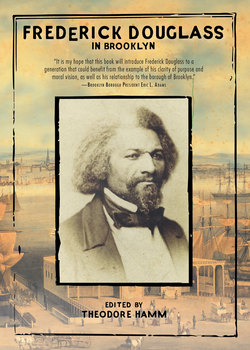Frederick Douglass in Brooklyn

Реклама. ООО «ЛитРес», ИНН: 7719571260.
Оглавление
Frederick Douglass. Frederick Douglass in Brooklyn
Отрывок из книги
Table of Contents
Note from Brooklyn Borough President Eric L. Adams
.....
Douglass, the Gloucesters, and an array of familiar New York City–area names would soon appear regularly in the pages of the Weekly Anglo-African, a publication that debuted in July 1859 (as an offshoot of an eponymous magazine). The publishers were two African American brothers from Brooklyn, Thomas and Robert Hamilton,[21] while its eventual leading editor was Douglass’s friend James McCune Smith,[22] who moved to Williamsburgh after the Draft Riots of 1863. Along with Douglass and Smith, the Anglo-African’s roster of regular contributors included New York City ministers Pennington and Henry Highland Garnet, Douglass’s longtime editorial companions Martin Delany and William C. Nell, and Brooklyn mainstays Reverend Gloucester, William J. Wilson, and Junius C. Morel. Despite such an all-star cast (and modest financial backing from Gerrit Smith), the paper struggled financially, and two years after its founding, the Hamiltons temporarily ceded control to James Redpath, a leading white proponent of Haiti colonization schemes for freed slaves (which Douglass briefly supported). In the summer of 1861, James McCune Smith, an opponent of colonization, led a successful effort to restore the Hamiltons’ control of the publication.[23] Over the ensuing several issues, a fundraising letter from James Gloucester appeared atop the Anglo-African’s editorial page. That November, the paper began serializing Martin Delany’s novel Blake; or the Huts of America—and early the next year, the author, a leading early voice of pan-Africanism, listed his address as 97 High Street, at the edge of Brooklyn Heights.[24] Like the Independent, the Anglo-African’s office was in Manhattan (near Park Row), but it was closely identified with Brooklyn.
The Anglo-African also provided extensive coverage of the assault on Harpers Ferry, including important details regarding Douglass’s role in supporting John Brown, a matter of historical dispute.[25] In mid-August 1859, Douglass stayed overnight at the Gloucesters’ home on his way to meet Brown in Chambersburg, Pennsylvania; while in town, the Anglo-African noted at the time, Douglass stopped by their office for “a short visit.” A few weeks later, the paper reported that “Frederick Douglass, Esq., will leave this city [New York] in early November, on a lecturing tour through Great Britain.”[26] It was a seemingly uncontroversial announcement, but Douglass would later use his stated travel plans as evidence that he was not planning to join Brown in Virginia, a charge leveled against him at the time. Like the leading daily papers in New York and Brooklyn, the Anglo-African documented the mid-October attack and its aftermath in exhaustive detail. Meanwhile, proslavery forces—led by the New York Herald—eagerly sought to implicate Douglass, who at the end of October fired back at his accusers in a letter to the Rochester Democrat. Though he did not denounce Brown and company, Douglass denied that he had “encouraged” their actions. He further insisted that he would never make any “promise so rash and wild” as a vow to participate.[27]
.....